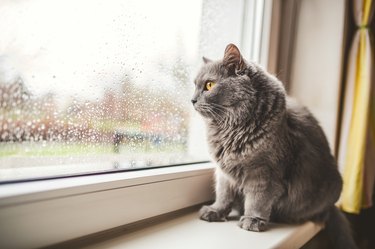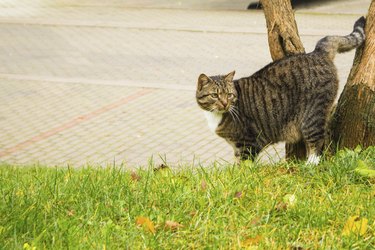
Cat spray is urine that the cat sprays across surfaces as a way to mark territory. Typically, it is male cats who spray, but both males and females are capable of doing it. Cats normally spray outside to mark territory, but will sometimes do it in inappropriate places such as inside the home or on piles of laundry. Inappropriate urination is not the same as cat spray.
Besides all the other good reasons to neuter your male cat — such as avoiding feline overpopulation and reducing fighting and roaming — another one stands out. Neutering often stops male cats from getting into the habit of spraying, which can start at the age of six months or earlier.
Video of the Day
Video of the Day
Tip
Neutering often stops male cats from getting into the habit of spraying, which can start at the age of six months or earlier, or whenever they reach sexual maturity.
Why cats spray
Scent is the primary way that cats communicate. The primary reason for cat spray, or urine marking, is to mark their territory, but there may be several reasons why a cat would do this. The Humane Society says that introducing new pets to the home could cause a cat to mark. Stress can also be a reason why a cat would want to stake out his boundaries. Consider this possibility, especially if your cat's urine marking is a new behavior.

Cat spraying is a notable part of a cat's mating behavior. If a cat has not been spayed or neutered, they will be very likely to spray. Unspayed female cats will spray to allow a male cat to find them. Males spray to mark their territory. If you get your cat "fixed" before they reach sexual maturity, you will likely never have a problem with spraying.
The Dumpster Cat Rescue League says 90 percent of male cats stop spraying within two months after neutering. Sometimes, cats will continue spraying even after they've been fixed because they have learned the behavior and it has become a habit. But the sooner a cat is fixed when it is safe to do so, the lower the chance that they will continue to spray.
When do cats start spraying?
If you have a young kitten or you have an un-neutered male cat, you may be asking yourself, at what age do male kittens become sexually active? A male kitten reaches puberty between the ages of 4 and 6 months. Most cats begin spraying around 6 to 7 months of age. The scent of a male cat's urine begins to change and smell more musky once they reach sexual maturity.
Urinating or spraying?

When a cat is truly spraying to mark territory and not simply urinating, the cat stands with their tail erect, with the rear end elevated. They may twitch the tail and move their hind feet up and down. You will usually see spray marking a few inches up a wall.
Urination takes place when the cat squats and lowers their rear end. While the smell of the cat spray can be strong, the Healthy Pet Club says it's usually less than half a teaspoon of liquid. If a cat urinates in an inappropriate spot outside the litter box, that will be a full-sized amount of urination. Inappropriate urination is usually a normal sized urination in places other than the litter box.
One symptom of a health condition such as kidney disease is the cat urinating outside of the litter box. A urinary tract infection can cause a cat to want to urinate somewhere cold and smooth, such as the cold bathtub or a tile floor. If you notice your cat urinating inappropriately, it can be a sign of more serious illness.
Always check with your veterinarian before changing your pet’s diet, medication, or physical activity routines. This information is not a substitute for a vet’s opinion.